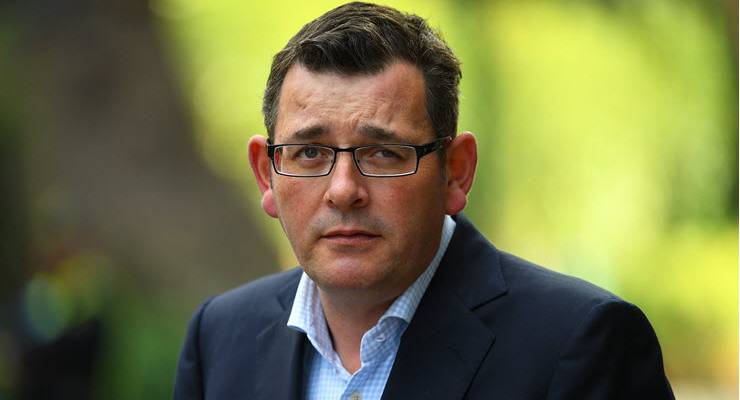
It looks like wildly popular Victorian Premier Dan Andrews may have won the war, but is rapidly losing the peace.
While his popularity remains sky high, the disastrous handling of the Cedar Meats outbreak and reticence to release Victorians from lockdown is placing increasing pressure on the Labor leader.
While Western Australia, South Australia and Queensland all re-open schools (and NSW starts a more gradual re-opening), Andrews has announced a very gradual easing today (five in-home visitors, see Virus Watch for more details) — with the promise of a bigger freeing up at the end of the month.
It is still unclear what and when is happening with Victorian schools. The Herald Sun has predicted that by May 25 some classes will return. If that’s so, it won’t be until mid-June that the bulk of Victoria students return to the classroom, more than a month after other states.
Andrews never fully locked down Victoria, allowing shopping centres and building sites to remain open (the latter due to pressure from the influential property lobby and CFMEU).
Meanwhile Labor-donating meat-packing plants continued to operate for weeks despite a positive test being returned. In the US, meat plants have been a hotspot of COVID-19, with many shutting and more than 5000 workers testing positive.
All the while Andrews has toed the line of education unions in refusing to open schools.
Andrews justified Victoria’s slow and inconsistent approach to reopening schools on the basis that there “have many more [cases of] community transmission, and that’s been a feature of Victoria”. The problem? Victoria has had significantly less ‘unknown contact’ cases than NSW.

The non fact-based approach of Victoria has meant that Andrews’ toughness of last week is quickly looking a lot more like cronyism.
Cometh the economic calamity, cometh the lobbyist
In one of the more audacious attempts at corporate welfare, Australia’s car park lobby has demanded that fringe benefits tax be suspended on parking. Parking Australia, the lobby group of the commercial car park sector (yes, it exists) claimed, “the move would help businesses by cutting tax bills and assist in getting staff back to work safely given concerns about hygiene and social distancing on public transport”.
Parking Australia even bemoaned that “the only winners out of FBT on car parking are accountants and the ATO (Australian Taxation Office).”
A couple of points to note.
First, the ATO is what funds our hospitals, schools, roads (yep, those things that allow cars to drive to garages where they can park for $25 an hour) and police.
Second, who exactly owns these car parks so in need of a taxpayer funded bailout of sorts?
First, there’s Care Parking, which is owned by Hong Kong-based Far East Consortium (market capitalisation, HK$6.5 billion). Far East, among other assets, owns 461 car parks and approximately 92,750 car parking bays globally.
Then there’s Secure Parking, which in 2017 was sold to Japanese Conglomerate PARK24, for $206 million. And of course there’s giant Wilson Parking, which has been owned by Hong Kong giant Sun Hung Kai Properties since 1991, which itself is owned by the billionaire Kwok Brothers.
Arguably it’s preferable to fund schools and hospitals, rather than Hong Kong based billionaires.
Elon Musk courts business (and baby name) controversy
There aren’t many global corporate types more colourful than Elon Musk. The Tesla and SpaceX founder, with a current net worth of US$40 billion, rarely strays far from the headlines.
Last week, Musk (who has five kids) and partner, rap singer Grimes, named their new baby boy “X Æ A-12 Musk”. Alas, this was not the most controversial thing Musk did last week.
Instead, he garnered significant criticism for tweeting that Tesla’s share price was “overvalued”, which caused an immediate 11% drop (around US$15 billion).
The response was swift, with Jeffrey A. Sonnenfeld, a senior associate dean at the Yale University’s School of Management claiming: “There’s no ambiguity, nothing grey about it, is a direct 100% violation of the SEC’s language. He’s not supposed to be able to comment on material information without it being cleared.”
While there is much to be critical of Musk, in this rare case, he was arguably doing good. Leaving aside the fact that Tesla shares have already returned to the pre-Tweet price, I’d much rather see CEOs claim that their company’s share price is overvalued, than the constant refrain from highly-paid executives (whose bonus depends on total shareholder returns), that the market is under-valuing their business.
But that doesn’t fit the narrative where boosting analysts and hack executives talk up share prices, while inevitably correct short-sellers are criticised for pointing out fraud and misfeasance.








Sorry Adam but Grimes is definitely not a rap singer. She crosses quite a few genres, rap would be the least of them. Here’s a taste of her quite delicious synth pop for your re-education. https://www.youtube.com/watch?v=N9XKLqGqwLA
Adam – please – not “reticence” (silent) but “reluctant”, ie not willing.
Herald Sun predicts about schools… That the best you could do ? Andrews is apparently beholden to unions and developers to keep some business open and beholden to other unions to keep schools closed. And of course the meatworks must be labeled donors before the more relevant caveat that meatworks are known problems elsewhere.
How does Dan do it. Popular with the public whilst under the thumb of unions and business. What a guy.
On the meatworks, can someone explain why a Labor-donating business was sourcing its workers from a dreaded labour hire firm? Ideologically inconsistent, to put it politely.
A brother for Oxx, Wrat, Glande, Deere and Life-saver?